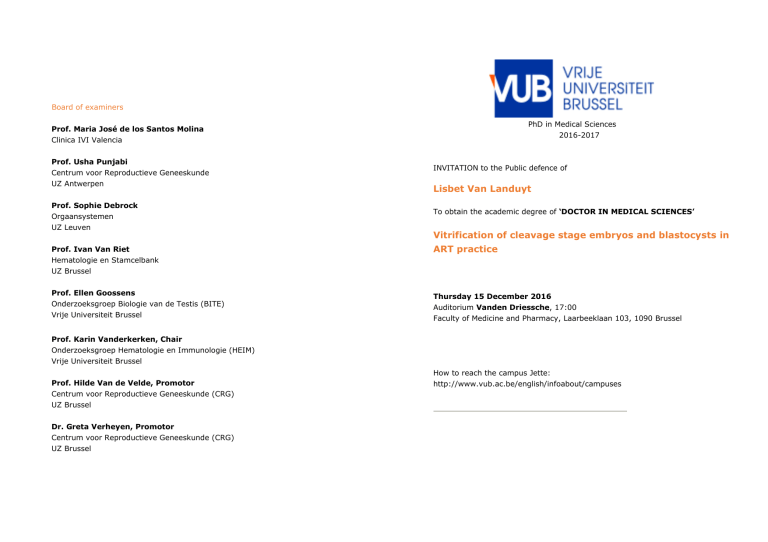
Board of examiners
PhD in Medical Sciences
2016-2017
Prof. Maria José de los Santos Molina
Clinica IVI Valencia
Prof. Usha Punjabi
Centrum voor Reproductieve Geneeskunde
UZ Antwerpen
Prof. Sophie Debrock
Orgaansystemen
UZ Leuven
INVITATION to the Public defence of
Lisbet Van Landuyt
To obtain the academic degree of ‘DOCTOR IN MEDICAL SCIENCES’
Vitrification of cleavage stage embryos and blastocysts in
Prof. Ivan Van Riet
Hematologie en Stamcelbank
UZ Brussel
ART practice
Prof. Ellen Goossens
Onderzoeksgroep Biologie van de Testis (BITE)
Vrije Universiteit Brussel
Thursday 15 December 2016
Auditorium Vanden Driessche, 17:00
Faculty of Medicine and Pharmacy, Laarbeeklaan 103, 1090 Brussel
Prof. Karin Vanderkerken, Chair
Onderzoeksgroep Hematologie en Immunologie (HEIM)
Vrije Universiteit Brussel
Prof. Hilde Van de Velde, Promotor
Centrum voor Reproductieve Geneeskunde (CRG)
UZ Brussel
Dr. Greta Verheyen, Promotor
Centrum voor Reproductieve Geneeskunde (CRG)
UZ Brussel
How to reach the campus Jette:
http://www.vub.ac.be/english/infoabout/campuses
Summary of the dissertation
Curriculum Vitae
The importance of cryopreservation in ART steadily increased over the
last decades due to the introduction of single embryo transfer to avoid
high risk multiple pregnancies. The general aim of this thesis was to
optimize the cryopreservation program for cleavage stage embryos (day
3) and blastocysts (day 5/6) at the Centre for Reproductive Medicine
(CRG) of UZ Brussel. Vitrification using a closed high security device was
implemented in our IVF centre in 2008 for blastocysts and in 2010 for
cleavage stage embryos in order to improve the efficiency of our
cryopreservation program in terms of embryo survival (and quality) on
the one hand and implantation rate on the other hand.
The outcome of the first two years of blastocyst vitrification was
evaluated. It was concluded that vitrification was successful for
blastocysts with or without blastomere biopsy on day 3. To further
improve the results of the blastocyst vitrification program, a randomised
controlled trial aimed to investigate the effect of laser-induced artificial
shrinkage on survival, quality and implantation potential of vitrifiedwarmed blastocysts. It was concluded that applying artificial shrinkage
before vitrification further increased the efficiency of the vitrification
program. For day 3 cleavage stage embryos, the consequence of postwarming cellular loss for the further developmental potential of
multicellular embryos was investigated and compared for the existing
slow freezing (DMSO) protocol and the newly introduced vitrification
method. Vitrified day 3 embryos showed higher survival rates and better
development after overnight culture than slowly frozen embryos,
regardless of the number of cells lost.
Lisbet Van Landuyt is born on May 8, 1973 in Dendermonde. She studied
Latin-Sciences at St-Vincentiusinstituut, Gijzegem, followed by Biological
and Pharmaceutical Techniques at Hoger Instituut St-Lieven, Gent where
she graduated cum laude in 1994.
She then studied Biomedical Sciences at the Vrije Universiteit Brussel
where she graduated magna cum laude in 1997. The title of her thesis
was ‘Micromanipulation-assisted Insemination of Mouse Oocytes’ that she
completed after her internship at the Centre for Reproductive Medicine
(CRM) under the promotorship of Prof. Dr. A.C. Van Steirteghem and Dr.
P. Nagy.
Since 1997 she is working as a clinical embryologist at the Centre for
Reproductive Medicine. In 2008 she obtained the ESHRE embryology
certificate of senior clinical embryologist.
She is author and co-author of 34 peer-reviewed articles in international
journals in the field of reproductive medicine and is appointed as
associate editor of Human Reproduction since 2014.
She was a board member of the ‘Vlaamse Vereniging van Klinisch
Embryologen’ (VVKE) (2012-2015) and of the ‘Belgian Society for
Reproductive Medicine’ (BSRM) (2014-2017).
She is proud mother of two sons Jan (11) and Lieven (9).












